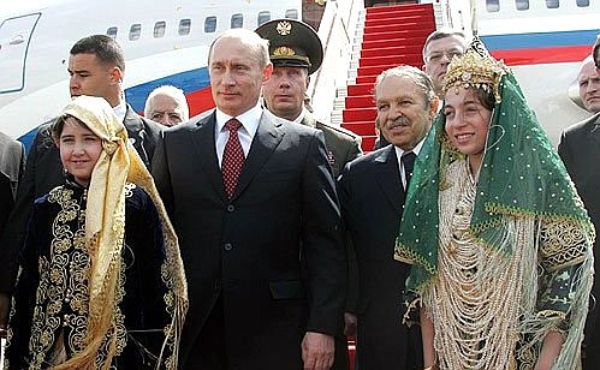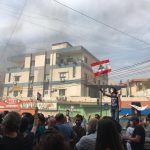by Giorgio Cafiero
The peaceful demonstrations that have brought millions of Algerians out to the streets of Algiers, Annaba, Bejaia, Blida, Constantine, Jijele, and Oran since last month have been astonishing. Not since the revolt against French colonial rule in the 1950s and 1960s have Algerians demonstrated in public in such numbers.
So far, the demonstrators have succeeded in pressuring President Abdelaziz Bouteflika not to seek a fifth term. Less clear are the next steps in terms of a conference for a new constitution and elections. Still unanswered questions include who will attend the conference, when it will take place, who will be allowed to participate in elections, the date(s) of elections, and so on. That 13 independent unions are rejecting Algeria’s newly appointed prime minister’s plan to establish a new government highlights major risks of political instability.
Many foreign powers have vested interests in what happens next in Algeria. Russia, in particular, has been closely monitoring the situation in the North African country. So far, the Kremlin has responded cautiously to changes taking place in Algeria that have potential to move in a variety of directions—both good and bad from Moscow’s perspective.
A Warm, Cold-War-Rooted Relationship
Since the 1960s, Algeria has been one of Moscow’s most important Arab partners from the standpoint of technical-military cooperation. Shortly after Algeria gained independence, the Soviet Union helped equip the country’s newly established army. According to Russian estimates, from 1962 to 1989, the Soviet Union supplied Algiers with $11 billion in military equipment that the Algerians could only afford because of $11 billion in loans that the Soviets extended to their country. By the time of the Cold War finished, approximately 90 percent of the Algerian People’s National Armed Forces (ANP)’s arsenal came from the Soviet Union.
After the Soviet Union imploded, Algeria’s relationship with Moscow grew less cooperative. During the 1990s, both countries were consumed with internal crises. While Russia’s economy was in free fall, Algeria was experiencing its “black decade” of conflict between regime security forces and radical Islamist insurgents, which resulted in 200,000 deaths. At the same time, Algeria’s decision to join NATO’s “Mediterranean Dialogue” became a source of tension between Algiers and the Kremlin.
Yet after the two countries’ current heads of state, Bouteflika and Vladimir Putin, took power in 1999 and 2000, respectively, bilateral relations began improving. In 2001, Bouteflika paid an official visit to the Russian capital shortly after Russian Foreign Minister Igor Ivanov came to Algiers. During Bouteflika’s visit to Moscow, he and Putin signed Russia’s first strategic partnership declaration with an Arab state—likely a move to counter Algiers’ decision to join the Mediterranean Dialogue—and both leaders discussed arms sales as well as cooperation in Algeria’s fuel and power sectors. Later that year, Moscow agreed to sell Algeria 22 advanced attack aircraft.
Putin’s historic visit to Algeria in March 2006 marked a watershed in bilateral affairs. Putin became the first top-level leader from Moscow to visit Algiers since 1969. Significantly, during Putin’s stop in Algeria both governments resolved a contentious debt issue with the Russians agreeing to write off the debt entirely if Algiers agreed to buy an equivalent amount of Russian industrial goods. Algeria also committed to buying $7.5 billion in military equipment from Moscow. According to the Russian press, this contract was the biggest in the defense sector that post-Soviet Russia had signed up until that point. Thanks largely to an upsurge in oil and gas prices, Algeria had enough resources to become Russia’s third largest buyer of military goods. Also, during the 2000s, Russia’s energy giants played a critical role in developing Algeria’s hydrocarbon mining sector and building of its pipeline infrastructure.
Arms sales continue to dominate bilateral affairs. Last year, Russia’s ambassador to Algeria, Igor Belyaev, revealed that Algeria purchases approximately 50 percent of Russian arms exports to the African continent. As gas and oil prices were relatively high during the time of the Arab Spring, Algeria was able to invest heavily in Russian weapons. From 2014 to 2018, when Algeria was the fifth largest importer of weapons worldwide, 66 percent of its arm imports were from Russia.
That said, in recent years, relations between Algeria and Russia have become about more than just arms sales. Regarding NATO’s intervention in Libya and the Western Sahara conflict—two major sources of regional instability on Algeria’s borders—Algerian and Russian leaders have basically been on the same page. Both countries have had similar stances regarding the U.S./UK-led invasion of Iraq in 2003, the Palestinian-Israeli conflict, the blockade of Qatar, the Yemeni civil war, the fight against the Islamic State, and the Syrian regime’s legitimacy. Beginning in 2016, the governments in Algiers and Moscow also began sharing intelligence on terrorist organizations’ movement throughout the Maghreb.
Over the years, Moscow has also been determined to establish a greater Russian presence in Algeria’s oil and gas sectors. But Algeria is Europe’s third largest natural gas supplier, so the energy relationship with Russia is more competitive than cooperative. Russia’s Gazprom does maintain assets in Algeria and has landed contracts in the Maghrebi country for exploring and developing oil and gas reserves. But Algerian laws on foreign investment are highly restrictive, limiting Gazprom’s ability to invest in Algeria.
Russia Eyes Protests
Having maintained warm ties with the Bouteflika government, Russia was careful to avoid officially responding to the protests that began in Algeria last month. Only on March 12 did the foreign ministry put out the following statement:
We perceive the events in Algeria as a strictly domestic affair in a Russia-friendly country. With that, we hope that the existing problems will continue to be settled in a constructive and responsible manner in the framework of a national dialogue oriented toward stability and further advancement of political and socio-economic transformations in the interest of Algerian people.
Russian analysts and pundits, however, opined on events in Algeria before their government officially did. Most in the Russian media have assessed the developments as an ‘Arab Spring 2.0’ or a “belated” North African uprising similar to Egypt’s anti-Mubarak uprising of 2011.
Given its opposition to post-Soviet “color revolutions,” Moscow often sides with fellow authoritarian regimes against popular uprisings. But the Kremlin’s support for autocratic governments only occurs when Moscow has reasons (legitimate or not) to believe that the protests were triggered, or at least exploited, by the meddling of Western powers—or when such protests threaten stability across international borders. In the cases of Tunisia in 2010/2011 and Armenia in 2018, by contrast, Russia did not express support for those countries’ ruling governments at the time of unrest.
If Algeria’s protests remain confined to cities and no foreign powers intervene in the country, Moscow may continue to hold its current stance. Russia’s priority is to preserve a long-term fruitful bilateral partnership with Algiers, not necessarily with the current political status quo. Moscow would like to see the Algerian government handle civic grievances in a way that doesn’t jeopardize the military and economic relationship.
Russian officials, however, are alert to the possibility of Algeria’s transition to the post-Bouteflika era not going smoothly. Russia naturally has concerns that Algerian unrest could, as in neighboring Libya, spiral into a civil war. Under such circumstances, Russia would face another test of whether to come to the defense of a beleaguered Arab state, as it has done in Syria. On March 19, Russian Foreign Minister Sergey Lavrov expressed his concerns about alleged efforts to destabilize Algeria just before he held talks in Moscow with Algerian Deputy Prime Minister Ramtane Lamamra, underscoring just how concerned the Kremlin is about the potential for Western meddling in “Russia friendly” countries.
So far, at least, Algeria has maintained peace and stability. The demonstrators have remained non-violent as they take to the streets to demand political change. Russian officials hope that Algeria’s government can adapt to new circumstances, implementing substantive reforms without losing control of the country or experiencing any periods of instability.






Thanks for this article, which explains a lot which never appears in other sources.